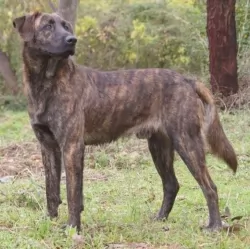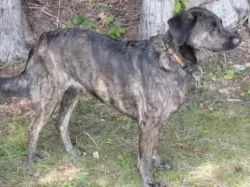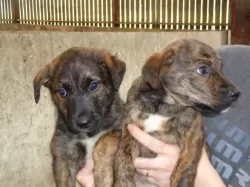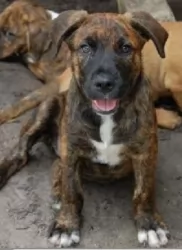 MyDogBreeds
MyDogBreeds Treeing Tennessee Brindle is originated from United States but Barbet is originated from France. Both Treeing Tennessee Brindle and Barbet are having almost same height. Both Treeing Tennessee Brindle and Barbet are having almost same weight. Treeing Tennessee Brindle may live 3 years less than Barbet. Both Treeing Tennessee Brindle and Barbet has same litter size. Treeing Tennessee Brindle requires Low maintenance. But Barbet requires Moderate maintenance
Treeing Tennessee Brindle is originated from United States but Barbet is originated from France. Both Treeing Tennessee Brindle and Barbet are having almost same height. Both Treeing Tennessee Brindle and Barbet are having almost same weight. Treeing Tennessee Brindle may live 3 years less than Barbet. Both Treeing Tennessee Brindle and Barbet has same litter size. Treeing Tennessee Brindle requires Low maintenance. But Barbet requires Moderate maintenance
 There doesn’t seem to be 100% clarity on how the dog came about but it originated in USA. It appears as though it was only since 1995 that records have been maintained through the American Kennel Club's Foundation Stock Service Program.
There doesn’t seem to be 100% clarity on how the dog came about but it originated in USA. It appears as though it was only since 1995 that records have been maintained through the American Kennel Club's Foundation Stock Service Program.
A Reverend Earl Phillips, who was a writer for a hunting magazine became aware of a Brindle Cur with a brown coat and tiger stripes. In fact ‘treeing’ is a type of hunting, where the dog chases an animal into a tree to escape. He heard about the dog’s amazing hunting skills.
In the early 1960s, he later formed The Treeing Tennessee Brindle Breeders Association, designed to protect the breed. It was in 2013 that the dog got foundation stock status with the American Kennel Club, but isn’t registered with the American Kennel Club.
 The Barbet is an ancient European waterdog, with the first references to it coming way back from 1387. This breed is thought to serve as a common ancestor for several other waterdogs, and these include the poodle. The breed was used to retrieve water fowl from water, and today it is used as a gundog and as a companion.
The Barbet is an ancient European waterdog, with the first references to it coming way back from 1387. This breed is thought to serve as a common ancestor for several other waterdogs, and these include the poodle. The breed was used to retrieve water fowl from water, and today it is used as a gundog and as a companion.
The name ‘Barbet’ comes from the French word for beard, which is ‘barbe’. The Kennel Club has announced that this dog is to be described as being in a class of its own, and it has become the 220th pedigree breed.
 The Treeing Tennessee Brindle is a medium sized, deep chested breed of Cur, descending from the Old Brindle Cur dog.
The Treeing Tennessee Brindle is a medium sized, deep chested breed of Cur, descending from the Old Brindle Cur dog.
These strong dogs have a short, smooth brindle coat that is fairly soft to the touch. The coat's color is a mix of tan, black and a little bit of white.
He stands at between 41 and 61cm in height and weighs between 14 and 23kg both male and female. The Treeing Tennessee Brindle has a loud bark and it is best that this dog lives on a farm or in the suburbs as opposed to living in a small space in the city.
The Treeing Tennessee Brindle is a friendly, social dog and this is why he doesn’t make a particularly good watchdog.
He gets on well with children in the home as well as other dogs, not showing any aggression towards them.
They’re intelligent dogs and it will be a good idea to have them trained and socialized to make them well balanced and well behaved.
 The Barbet is a medium-sized breed of French water dog, measuring anything between 52–66cm in height. The dog is known for his thick, curly textured coat and even the head and tail are covered with this dense hair. His coat is waterproof.
The Barbet is a medium-sized breed of French water dog, measuring anything between 52–66cm in height. The dog is known for his thick, curly textured coat and even the head and tail are covered with this dense hair. His coat is waterproof.
The coat can vary in color and these colors can be brown, grey, white, fawn or black. The dog isn’t a heavy shedder. The Barbet’s tail is long and somewhat raised but not erect. He has long, wide pendant ears set at eye height, the skull is broad and the neck short and strong.
With his kind brown eyes, it simply adds to the kindly expression of this attractive gun dog. He is a friendly, fun-loving dog, and makes a great family pet. He loves to swim and in fact has webbed paws to assist him with his swimming. Some dog owners say that this intelligent active breed can be a great watchdog, while others say the being a guard dog isn’t a particularly strong characteristic.
 This brindle-colored cur dog is brave, intelligent and lively and his temperament allows him to be a good companion for his human family.
This brindle-colored cur dog is brave, intelligent and lively and his temperament allows him to be a good companion for his human family.
Even though they are friendly around strangers, they still make good watchdogs and will alert you to all kinds of visitors to your property. They do best in a home with large grounds and an active family where they can explore and sniff around. At the end of the day, they love to lie contentedly at your feet, a loyal, loving companion.
 Most Barbets do superbly well with children and are naturally gentle with them. It is always important to teach children to respect animals and to be kind towards them. Even a gentle dog like the Barbet can turn aggressive if taunted beyond their endurance.
Most Barbets do superbly well with children and are naturally gentle with them. It is always important to teach children to respect animals and to be kind towards them. Even a gentle dog like the Barbet can turn aggressive if taunted beyond their endurance.
Barbets are social, good mixers and they get on well with other pets in the family, more so when they have been properly socialized. As a Sporting breed, the Barbet is energetic and loves to be involved in games and activities. He is such a versatile dog – gentle and friendly and he makes a wonderful devoted pet. Of course, he is also suited for use as a working dog, after all this breed was originally used for hunting waterfowl.
Treat him well and the thanks you’ll get will is unconditional friendship and loyalty.
 The Treeing Tennessee Brindle is a robust, healthy breed. You’re not likely to battle with too many health issues with him.
The Treeing Tennessee Brindle is a robust, healthy breed. You’re not likely to battle with too many health issues with him.
Watch out for ear infections which are more common in floppy eared dogs. Other common dog diseases that you need to know about -
This is a viral disease which is highly contagious and with no known cure. It’s why there is a vaccine against it. Coughing, lethargy, high temperature and loss of appetite with vomiting are symptoms of this disease.
This is another highly contagious respiratory viral infection transmitted between dogs in close proximity to each other, like in kennels for instance.
Symptoms include coughing, sneezing, nasal discharge, breathing difficulties, lethargy and loss of appetite. It’s important to get veterinary assistance as pneumonia could set in.
 The Barbet is a rare breed and therefore not much is known about particular health issues affecting him. Some health issues that you will need to be alert about with your Barbet are ear infections, hernias and hip dysplasia.
The Barbet is a rare breed and therefore not much is known about particular health issues affecting him. Some health issues that you will need to be alert about with your Barbet are ear infections, hernias and hip dysplasia.
A veterinarian should be consulted if your dog shows signs of these ailments. The risk of a Barbet developing any health condition can always be significantly reduced by making sure you buy your Barbet from a reputable breeder. If he is fed well and taken to the vet when he does get sick, he can live to be 13 to 15 years of age.
 A brush once or twice a week will be sufficient for this dog. Look inside his ears for signs of redness which could indicate an ear infection. Make sure his eyes are still bright and not red and with a pus discharge. Trim his nails too.
A brush once or twice a week will be sufficient for this dog. Look inside his ears for signs of redness which could indicate an ear infection. Make sure his eyes are still bright and not red and with a pus discharge. Trim his nails too.
The Treeing Tennessee Brindle is a high energy dog and he is going o want more than just a walk every day, although he will love that and rely on you for this daily outing.
He will also want ball games and hide and seek games.The breed needs an active owner who will take him on long walks and hikes.
Whenever you opt to give a dog commercially manufactured dog food, you need to check that the dog food is made with high-quality ingredients which are mostly made up of protein or meat.
Certainly a puppy will need protein in his food for proper growth and he will require 4 bowls of food a day. An adult dog will require 2 bowls of food a day.
The type of commercial dog food you buy will depend on the age of your dog as well as his activity levels. If your dog has a known allergy or illness, there are dog foods manufactured with that in mind.
Try and in include some homemade food into his diet. Nothing spicey and exotic as this can cause stomach problems. A good guide is boiled chicken, brown rice and vegetables.
 The Barbet’s coat is longish and curly, much like a poodle, and long, wooly coat This being the case, moderate maintenance is required. Brushing and grooming twice a week will be necessary to keep the coat from matting too much. In fact, some Barbet owners prefer to keep their Barbets professionally groomed so that the thick hair is fairly short all over.
The Barbet’s coat is longish and curly, much like a poodle, and long, wooly coat This being the case, moderate maintenance is required. Brushing and grooming twice a week will be necessary to keep the coat from matting too much. In fact, some Barbet owners prefer to keep their Barbets professionally groomed so that the thick hair is fairly short all over.
The dog’s ears will also need to be kept clean and dry.
If your Barbet is a farm dog, used for hunting or working purposes, make sure to buy dog food formulated for active dogs. Your Barbet puppy up to the age of 3 months will require 4 meals a day. When your Barbet reaches a year of age he can be fed one or two bowls of food. Speak to your veterinarian about top-quality wet- and dry foods. Every dog will require raw meat added into their food once in a while.
Make sure there is a constant supply of cool, fresh water and also wash his food and water bowls regularly.
The Barbet is an intelligent breed and therefore trainable. Dog owners who care for their pets, see to it that they are trained and have been socialized. This makes dogs much nicer to live with as they get on well with children and other pets and they don’t bark incessantly.
The Barbet is a working breed so you can’t just leave him in your back garden day after day. To stay healthy and happy, he will need to be played with, taken for walks and exercised regularly.